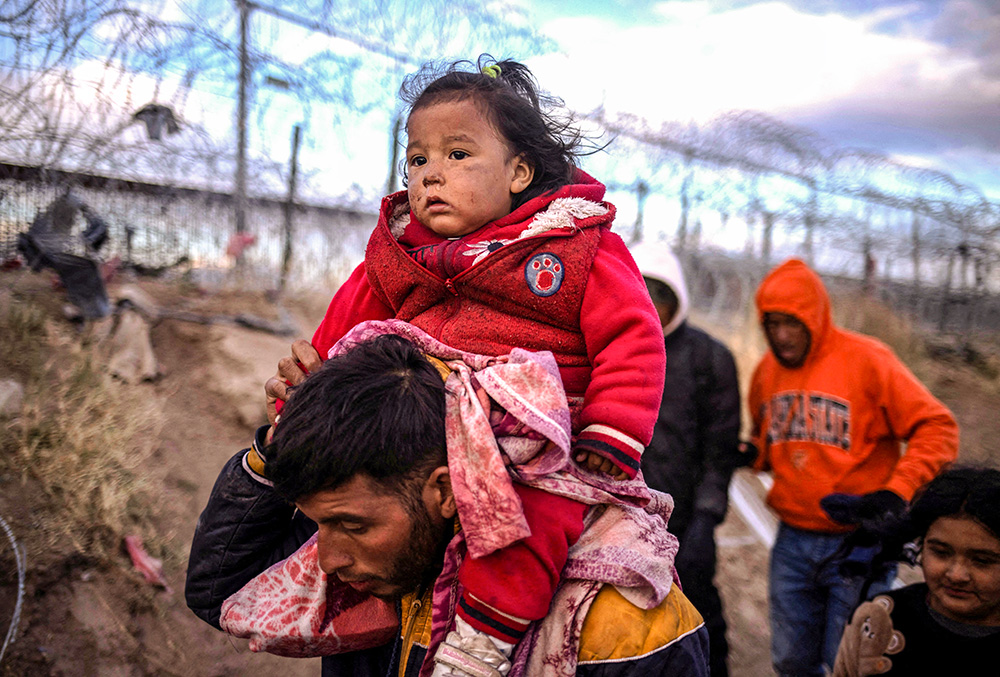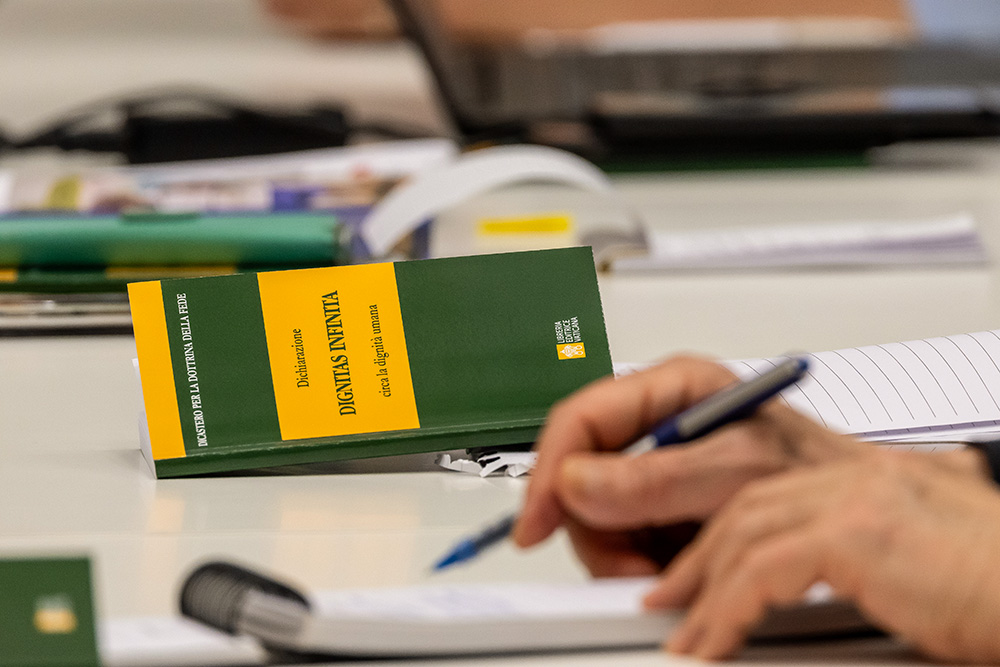
Briana, a 1-year-old migrant girl from Peru, is carried by her father, Jordan, as they search for an entry point into the United States past a razor wire-laden fence along the bank of the Rio Grande in El Paso, Texas, March 26. (OSV News/Reuters/Adrees Latif)
The students and I stood in a packed migrant shelter in Altar, Sonora, Mexico, in front of several young men who had clambered down from three-tiered bunk beds attached high up on the wall.
"What do you want us to tell people back in the United States about you?" one of us asked. Altar is 60 miles south of the border and a key staging point for the migration route north.
"Tell them that we are not animals," one young man responded quickly and crisply.
Those piercing words have stayed with me since that immersion trip more than a decade ago with Santa Clara University students. And that hounded, defiant statement echoed in my mind as I thought about the strengths and weaknesses of the treatment of the concept of dignity in Dignitas Infinita, the Vatican document on human dignity released on April 8.
In short, the document does an excellent job of establishing the inalienable and infinitely valuable character of human dignity. Neither that young man in Altar nor any migrant anywhere is anything less than an infinitely dignified human being.
The document fares less well in how it embeds such a transcendent sense of dignity into the concrete circumstances of life.
Dignity as gift and task
As ethics go, dignity is among the most complex, controversial and visceral ideas. The bioethicist Ruth Macklin called it a "useless concept" invoked usually to squelch needed if controversial research and in effect meaning no more than personal autonomy. The moral philosopher Alasdair McIntyre criticized how a pluralist society like ours deploys the concept of dignity to signal agreement on controversial matters when in fact no such agreement exists.
Advertisement
In the face of such critical views, Dignitas Infinita lays out a coherent and powerful account of the meaning of dignity. It argues that each person bears infinite and inalienable dignity on account of being willed, created and loved by the infinite God.
But this dignity is both gift and task. Dignity as a gift is a passive trait: We can't do anything to get it or to lose it. But the gift comes with a task: We are free and responsible beings meant to live just and loving and holy lives. Depending on how we live out that task, we can fulfill or contradict the original gift.
Moreover, the conditions we encounter in life may be dignified or undignified (in this regard the document discusses poverty, migration and violence), insofar as they help or hinder the fulfillment of this task. There's more to the document than this kernel of its argument. But this kernel provides all kinds of conceptual and prophetic power for thinking about dignity in its personal and political manifestations in American life.
'Dignity beyond every circumstance'
The strongest argument of the document is its often-repeated claim that dignity is an inalienable attribute of every human being. Here a powerful argument from Christian faith meshes well with common human intuition.
The document refers to this claim as "dignity beyond every circumstance." This idea challenges the way American culture strips dignity from people on death row or from the unhoused or from the complex persons lost behind our ideological use of terms like "colonizer" and "colonized."

Cardinal Víctor Manuel Fernández, prefect of the Dicastery for the Doctrine of the Faith, takes notes during a news conference to present the dicastery's declaration Dignitas Infinita, a copy of which is nearby, at the Vatican press office April 8. (CNS/Pablo Esparza)
But the biggest cultural challenge now comes from the way we talk about migrants. Dignitas Infinita quotes Pope Francis from his 2020 encyclical Fratelli Tutti: "No one will ever openly deny that [migrants] are human beings; yet, in practice, by our decisions and the way we treat them, we can show that we consider them less worthy, less important, less human."
But, of course, Donald Trump has openly denied the humanity of migrants — "They're not people, in my opinion," he said at a March rally in Ohio — and he has done so to great roars of approval. What the young man felt at the shelter in Altar has gotten much worse.
Dignity embedded in circumstances
It's true that dignity is "beyond every circumstance." But it's also true that, incarnate beings that we are, dignity is always embedded in many circumstances. And it's on this latter aspect of dignity that the document falters.
To be sure, the document notes how dignity belongs to our bodies and is enmeshed in relationships. But these aspects of dignity are underdeveloped in favor of an emphasis on "dignity beyond every circumstance."
And as philosopher Michael Rosen noted in his 2012 book Dignity: Its History and Meaning: The "need to balance competing claims becomes lost from sight as soon as dignity is represented as an inner transcendental kernel, a core of value that must be protected above all."
It's true that dignity is 'beyond every circumstance.' But it's also true that, incarnate beings that we are, dignity is always embedded in many circumstances.
We can see why this matters in the document's discussion of abortion, which invokes the inalienable dignity of a fetus from "conception to natural death" to protest the injustice of abortion but not once refers to the dignity of a pregnant woman, to her relationship with a fetus, and to the dignity of her body. Taking note of such realities isn't a concession to a permissive culture. It's a recognition of the actual moral complexity that gives rise to the legitimately competing claims of the issue.
One last underdeveloped aspect of dignity in the document comes to mind as I think of that young man at the migrant shelter in Altar. To be sure, he has a "dignity beyond every circumstance." But to leave things in such abstract terms leaves out something visceral: To have dignity also means you belong; you are an equal member of the moral community; you are recognized for who you are and bow down to no one on that account.
Dignitas Infinita refers to such a connection between dignity, mutual recognition, and community. But Francis discusses this connection more in Fratelli Tutti when he says that the role of the Catholic Church in politics should be animated by the divine love known as caritas: "Only a gaze transformed by caritas can enable the dignity of others to be recognized ... and thus truly integrated into society."
May the Catholic leadership in this country drop the futility of culture wars and take up the mantle of transforming our gaze.








